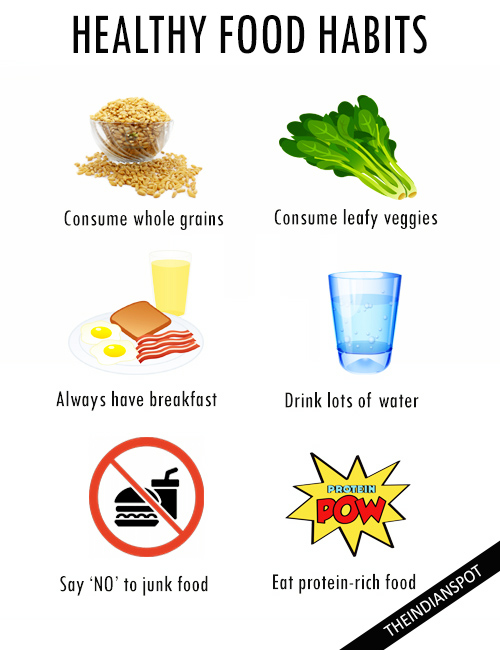With the number of diet plans and pills on the market, it’s hard to know what truly constitutes a healthy lifestyle. The key to good nutrition is to make small, sustainable changes in your diet, such as planning meals and eliminating trigger foods from your pantry. Get these habits right, and you will be well on your way to maintaining a healthy body weight. Here are the top 10 healthy food habits for healthy lifestyle:

- EAT REGULARLY
Schedule meals and snacks into your day. By eating every few hours, you’ll keep your blood sugar from crashing and will have more energy. If you bring a healthy snack with you to work, you’ll be less likely to indulge in the treats offered by coworkers.
- SWITCH TO HEALTHY WHOLE GRAINS
Whole grains offer far more nutrients and fibre than their refined “white” varieties. Whole grains tend to have a lower GI (glycaemic index), so they help keep you feeling fuller for longer and maintain your energy levels and concentration. On the taste side, whole grains have more texture, flavour and nuttiness than refined ones.
- CHOOSE GREEN LEAFY VEGETABLES
Make sure to add green leafy vegetables to your diet. They are a rich source of proteins, iron, calcium and fibre. Green leafy vegetables are easy to prepare and quite appetizing too. Also, a short course in Ayurvedic cooking will help expand your menu.
- EAT SMALLER PORTIONS
Serving sizes have ballooned recently. When dining out, choose a starter instead of an entree, split a dish with a friend, and don’t order supersized anything. At home, visual cues can help with portion sizes- your serving of meat, fish, or chicken should be the size of a deck of cards and half a cup of mashed potato, rice, or pasta is about the size of a traditional light bulb. If you don’t feel satisfied at the end of a meal, add more leafy green vegetables or round off the meal with fruit.
- ADOPT HEALTHY COOKING METHODS
The more you “do” to your food, the less it does for you. So avoid things like deep-frying, which drenches your food in unnecessary calories, and boiling vegetables until they’re drained of colour, as this will sap them of nutrients. Adopt cooking habits like grilling fish and vegetables instead of frying, Using herbs, spices and ground pepper instead of salt, Using balsamic vinegar or lemon juice instead of salad dressing etc.
- ALWAYS EAT BREAKFAST
Studies show that individuals who eat a substantial breakfast lose more weight than those who have a small breakfast. Choose eggs or baked beans on wholegrain bread, or muesli with fruit and yoghurt.
- DRINK ENOUGH WATER
Drinking enough water is a vital part of any conditioning program because it keeps your body functioning in homeostasis and aids every aspect of bodily function. Highly successful fit people drink at least six to eight 12-ounce glasses of water a day, plus more as needed during exercise.
Note: It’s possible to drink too much water, which dilutes the body’s electrolytes (potassium, sodium, chloride, magnesium). Don’t drink more than a gallon a day unless you’re also replenishing your electrolytes.
- KEEP AWAY FROM FAST-FOODS AND SOFT DRINKS
Although it may appease your taste buds, fast-food usually does a lot of harm to the body. It can be unhygienic and also high on unhealthy fats like trans-fats. Also, carbonated soft drinks have a high sugar content which may lead to obesity, diabetes and dental caries. Instead of these harmful drinks, choose to refresh yourself with a glass of buttermilk or lemonade.
- CHEW YOUR FOOD
One of the easiest and obvious ways to digest food is to chew it. Most people often eat their food in a hurry and tend to skip chewing their food properly. While what you eat eventually does get digested, but a barely chewed morsel takes more time and tires your digestive system. Besides, the more you chew your food, the easier it becomes for your stomach to digest it and the more calories you burn moving those jaws.
- INCLUDE ENOUGH PROTEINS IN YOUR DIET
Proteins are vital for the body and should definitely be included in the diet. Broccoli, soybeans, lentils, asparagus and spinach are some commonly found protein rich foods. Low-fat dairy products are also a rich source of proteins. Insure that your body receives the required amount of proteins daily.